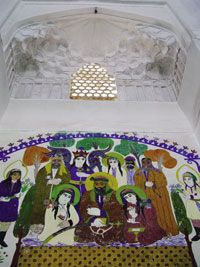Note: Addendum added to bottom.
--
Fact: before 9/11, NSA listened in on suspected terrorist phone calls from overseas to the U.S., then refused to contact the FBI regarding the U.S. parties to the conversations. They feared they would be charged with domestic spying if they breached the "Gorelick Wall" between international and domestic intelligence.
--
Fact: after 9/11, NSA listened in on these same conversations, but passed on relevant leads about American citizens to the FBI. This was new. FBI investigations were then conducted, and sometimes the FBI went to FISA for wiretap warrants.
--
Speculation: When the FBI went to FISA, they had to justify why an American citizen should be considered a suspect worthy of being wiretapped. The FBI would include either of both of these:
1) the suspect spoke either to a suspected terrorist, or to a terrorist-frequented phone location; and/or
2) the contents of that phone conversation.
--
Fact: FISA judges reportedly have concerns that illegally obtained information is being used to justify suspect status for American citizens, thus justifying a FISA warrant. The FISA judges want more information about how certain international phone calls are identified to be listened to.
--
Speculation: when FISA judges understand NSA procedure, their concerns will be mollified. NSA is using data mining and signals intelligence procedures to identify telephone calls which originate from suspicious sources. NSA procedures are all about mathematics, statistical regressions, and gigantically powerful computers doing comparisons and computations. Data mining is a powerful tool, and FISA judges will agree that it justifies listening in on certain international conversations.
A.J. Strata:
Over and over again the administration has been clear the focus was international calls, focused on targets overseas, which could legally include contacts here in the US. Monitoring a call doesn't require legal authority specific to both sides of a call. Only one side needs to be legally authorized, and international calls are authorized outside FISA as long as the target it overseas.If, in monitoring Party A's phone call from Europe to the U.S., Party B in the U.S. begins to look suspicious - are we supposed to ignore that? Do Democrats and the NYT want us to ignore that? In the days of the Gorelick Wall, we did ignore that, to protect American citizens against overstepping of bounds by agencies such as the FBI, CIA, and NSA.--
Fact:
FBI agents complained to the NYT that they had to investigate so many unfruitful leads given to them by NSA.
--
Speculation: These complaints amount to a bunch of nothing. Maybe we need more agents or investigators. However, the fact that FBI agents may have to run one hundred investigations to hit on one terrorist means nothing. The one terrorist needs to be caught. The complaining FBI agents are spoiled, and have tunnel vision.
--
Fact: Many times, the White House briefed the leaders of relevant Senate Committees about the Signals Intelligence Program. Democrats are now complaining that the White House should have briefed entire Senate Committees, instead of the leaders of Senate Committees. There is language, somewhere, which says the White House shall brief the relevant committees.
--
Speculation: These complaints, though technically true, will amount to a bunch of nothing. Its hard to make a common sense case that the White House was negligent about informing the Senate. This is another area of Executive Branch vs. Legislative Branch tension. Violations in this area are not so much violations of law, as they are elbowing amongst equals, for power and position. The language about informing relevant
committees could be changed at any time. Something else: Senators cannot be trusted to keep a secret. I would love to see the White House throw some Executive Branch/Constitution elbows over this issue, then see where it all sorts out in a SCOTUS case. And, it won't happen b/c Repubs control Congress, but I'd love to see Congress try to justify withholding NSA funding to the public by whining that
"The White House only briefed the heads of committees, and not the entire committees."Yep. I'd like to see what public opinion would be about
that complaint. A boy can dream.
--
Fact: When the first NYT story broke, there was immediate speculation that the U.S. was using an Echelon style program to key in on words and phrases your grandmother might use, and then listen in on her conversations. General Michael V. Hayden is
PRINCIPAL DEPUTY DIRECTOR OF NATIONAL INTELLIGENCE, AND FORMER DIRECTOR OF THE NATIONAL SECURITY AGENCY. In an address the The National Press Club in Washington on 1/23/06, General Hayden
said the NSA program is specifically targeted, and is"not a driftnet over Dearborn or Lackawanna or Freemont grabbing conversations that we then sort out by these alleged keyword searches....
[...]
(responding to a question): [W]e're not there sucking up coms and then using some of these magically alleged keyword searches -- "Did he say 'jihad'? Let's get --" I mean, that is not -- do you know how much time Americans spend on the phone in international calls alone, okay? In 2003, our citizenry was on the phone in international calls alone for 200 billion minutes, okay? I mean, beyond the ethical considerations involved here, there are some practical considerations about being a drift net. This is targeted, this is focused. This is about al Qaeda. "
Speculatively reading between the lines: an Echelon-type capability is being utilized - but in a targeted fashion . I will include General Hayden's best remarks - and they were very enlightening - in an addendum at the bottom of this post. The Bush Administration is loudly and repeatedly claiming:1) The NSA program targets calls which originate from overseas
2) No domestic wiretapping is done without a FISA warrant.
I see no profit in the Bush Administration lying about this so publicly and so vociferously. I give them the benefit of the doubt. I speculate that Echelon-type capability is being used inside the U.S. - with a FISA warrant in hand. The NSA Kerfluffle looks like a case of wishful thinking, jumping to conclusions, and controversy fanning by the MSM and the Dems.
Time Magazine, previewing A.G. Gonzales testimony to the Senate:"Contrary to the speculation reflected in some media reporting," Gonzales writes, "the terrorist surveillance program is not a dragnet that sucks in all conversations and uses computer searches to pick out calls of interest. No communications are intercepted unless first it is determined that one end of the call is outside of the country and professional intelligence experts have probable cause (that is, ‘reasonable grounds to believe') that a party to the communication is a member or agent of al-Qaeda or an affiliated terrorist organization."
--Speculation: This story started with leaks from Senator Rockefeller(click here to read his disgusting memo on how to use his Intelligence Commitee Chairmanship to hurt Bush politically) and from FISA Judge Robertson(click here and here to peruse some of his questionable judicial acts) to the NYT. The main allegations concern
- FISA judge concerns about how phone calls are targeted by NSA,
- FBI agent complaints that they are tracking too many unfruitful leads, and
- Senate Democrat political complaints about entire committees not being briefed.
That's why this is merely a kerfluffle, and not a full-fledged scandal. In future, maybe there will be a full-fledged scandal over a domestic, Echelon-type driftnet program. This is not it.
Update:A.J. Strata
expertly explains the kerfluffle, including this bit:
the (Washington) Post confirms the big change was not directing NSA to do something different, but it was to have NSA pass information to domestic law enforcement, which would take high interest targets to FISA. A formal process was apparently set up with FISA in 2002 to open the door to these ‘tainted’ leads:
Yet a special channel set up for just that purpose four years ago has gone largely unused, according to an authoritative account. Since early 2002, when the presiding judge of the federal intelligence court first learned of Bush’s program, he agreed to a system in which prosecutors may apply for a domestic warrant after warrantless eavesdropping on the same person’s overseas communications. The annual number of such applications, a source said, has been in the single digits.
Clear as a bell - the NSA was not passing leads to FBI-FISA before then.
We should all note that over the last 4.5 years since 9-11, the Post is saying up to 45 terrorists may have been detected in the US before they could execute their plans to kill Americans. And Bush is in trouble for this?
Addendum:Remarks of General Hayden, former Director of NSA, on 1/23/06, at The National Press Club:
...February of 2000. The great urban legend out there then was something called "Echelon" and the false accusation that NSA was using its capabilities to advance American corporate interests -- signals intelligence for General Motors, or something like that. You know, with these kinds of charges, the turf back then feels a bit familiar now. How could we prove a negative -- that we weren't doing certain things -- without revealing the appropriate things we were doing that kept America safe? You see, NSA had, NSA has an existential problem. In order to protect American lives and liberties, it has to be two things: powerful in its capabilities, and secretive in its methods. And we exist in a political culture that distrusts two things most of all: power and secrecy.
[...]
And by the way, "U.S. person" routinely includes anyone in the United States, citizen or not.
So, for example, because they were in the United States -- and we did not know anything more -- Mohamed Atta and his fellow 18 hijackers would have been presumed to have been protected persons, U.S. persons, by NSA prior to 9/11.
[...]
Inherent foreign intelligence value is one of the metrics we must use to ensure that we conform to the Fourth Amendment's reasonable standard when it comes to protecting the privacy of these kinds of people. If the U.S. person information isn't relevant, the data is suppressed. It's a technical term we use; we call it "minimized." The individual is not even mentioned. Or if he or she is, he or she is referred to as "U.S. Person Number One" or "U.S. Person Number Two." Now, inherent intelligence value. If the U.S. person is actually the named terrorist, well, that could be a different matter.
[...]
Now, as another part of our adjustment, we also turned on the spigot of NSA reporting to FBI in, frankly, an unprecedented way. We found that we were giving them too much data in too raw form. We recognized it almost immediately, a question of weeks, and we made all of the appropriate adjustments. Now, this flow of data to the FBI has also become part of the current background noise, and despite reports in the press of thousands of tips a month, our reporting has not even approached that kind of pace. You know, I actually find this a little odd. After all the findings of the 9/11 commission and other bodies about the failure to share intelligence, I'm up here feeling like I have to explain pushing data to those who might be able to use it. And of course, it's the nature of intelligence that many tips lead nowhere, but you have to go down some blind alleys to find the tips that pay off.
[...]
I testified in open session to the House Intel Committee in April of the year 2000. At the time, I created some looks of disbelief when I said that if Osama bin Laden crossed the bridge from Niagara Falls, Ontario to Niagara Falls, New York, there were provisions of U.S. law that would kick in, offer him protections and affect how NSA could now cover him. At the time, I was just using this as some of sort of stark hypothetical; 17 months later, this is about life and death.
[...]
in the end, NSA would have to implement this, and every operational decision the agency makes is made with the full involvement of its legal office. NSA professional career lawyers -- and the agency has a bunch of them -- have a well-deserved reputation. They're good, they know the law, and they don't let the agency take many close pitches.
And so even though I knew the program had been reviewed by the White House and by DOJ, by the Department of Justice, I asked the three most senior and experienced lawyers in NSA: ...how did these activities square with these facts?
They reported back to me. They supported the lawfulness of this program. Supported, not acquiesced. This was very important to me. A veteran NSA lawyer, one of the three I asked, told me that a correspondent had suggested to him recently that all of the lawyers connected with this program have been very careful from the outset because they knew there would be a day of reckoning. The NSA lawyer replied to him that that had not been the case. NSA had been so careful, he said -- and I'm using his words now here -- NSA had been so careful because in this very focused, limited program, NSA had to ensure that it dealt with privacy interests in an appropriate manner. In other words, our lawyers weren't careful out of fear; they were careful out of a heartfelt, principled view that NSA operations had to be consistent with bedrock legal protections.
[...]
The purpose of all this is not to collect reams of intelligence, but to detect and prevent attacks. The intelligence community has neither the time, the resources nor the legal authority to read communications that aren't likely to protect us, and NSA has no interest in doing so. These are communications that we have reason to believe are al Qaeda communications
[...]
Their work is actively overseen by the most intense oversight regime in the history of the National Security Agency.
[...]
Let me talk for a few minutes also about what this program is not. It is not a driftnet over Dearborn or Lackawanna or Freemont grabbing conversations that we then sort out by these alleged keyword searches or data-mining tools or other devices that so-called experts keep talking about.
This is targeted and focused. This is not about intercepting conversations between people in the United States. This is hot pursuit of communications entering or leaving America involving someone we believe is associated with al Qaeda. We bring to bear all the technology we can to ensure that this is so. And if there were ever an anomaly, and we discovered that there had been an inadvertent intercept of a domestic-to-domestic call, that intercept would be destroyed and not reported. [...]
So let me make this clear. When you're talking to your daughter at state college, this program cannot intercept your conversations. And when she takes a semester abroad to complete her Arabic studies, this program will not intercept your communications.
Let me emphasize one more thing that this program is not -- and, look, I know how hard it is to write a headline that's accurate and short and grabbing. But we really should shoot for all three -- accurate, short and grabbing. I don't think domestic spying makes it. One end of any call targeted under this program is always outside the United States.
[...]
Had this program been in effect prior to 9/11, it is my professional judgment that we would have detected some of the 9/11 al Qaeda operatives in the United States, and we would have identified them as such.
I've said earlier that this program's been successful. Clearly not every lead pans out from this or any other source, but this program has given us information that we would not otherwise had been able to get. It's impossible for me to talk about this any more in a public way without alerting our enemies to our tactics
[...]
American intelligence, and especially American SIGINT, signals intelligence, is the frontline of defense in dramatically changed circumstances, circumstances in which if we fail to do our job well and completely, more Americans will almost certainly die. The speed of operations, the ruthlessness of the enemy, the pace of modern communications have called on us to do things and to do them in ways never before required. We've worked hard to find innovative ways to protect the American people and the liberties we hold dear. And in doing so, we have not forgotten who we are either.
Thank you. I'll be happy to take your questions. [...]
QUESTION: Yes, Wayne Madsen, syndicated columnist. General, how do you explain the fact that there were several rare spectacles of whistleblowers coming forward at NSA, especially after 9/11, something that hasn't really happened in the past, who have complained about violations of FISA and United States Signals Intelligence Directive 18, which implements the law at the agency?
GEN. HAYDEN: I talked to the NSA staff on Friday. The NSA inspector general reports to me, as of last Friday, from the inception of this program through last Friday night, not a single employee of the National Security Agency has addressed a concern about this program to the NSA IG. I should also add that no member of the NSA workforce who has been asked to be included in this program has responded to that request with anything except enthusiasm. I don't know what you're talking about.
[...]
GEN. HAYDEN: NSA cannot -- under the FISA statute, NSA cannot put someone on coverage and go ahead and play for 72 hours while it gets a note saying it was okay. All right? The attorney general is the one who approves emergency FISA coverage, and the attorney general's standard for approving FISA coverage is a body of evidence equal to that which he would present to the court. So it's not like you can throw it on for 72 hours.
[...]
In the instances where this program applies, FISA does not give us the operational effect that the authorities that the president has given us give us. Look. I can't -- and I understand it's going to be an incomplete answer, and I can't give you all the fine print as to why, but let me just kind of reverse the answer just a bit. If FISA worked just as well, why wouldn't I use FISA? To save typing? No. There is an operational impact here, and I have two paths in front of me, both of them lawful, one FISA, one the presidential -- the president's authorization. And we go down this path because our operational judgment is it is much more effective. So we do it for that reason.
[...]
I'm saying that the characteristics we need to do what this program's designed to do -- to detect and prevent -- make FISA a less useful tool.[...]we're not there sucking up coms and then using some of these magically alleged keyword searches -- "Did he say 'jihad'? Let's get --" I mean, that is not -- do you know how much time Americans spend on the phone in international calls alone, okay? In 2003, our citizenry was on the phone in international calls alone for 200 billion minutes, okay? I mean, beyond the ethical considerations involved here, there are some practical considerations about being a drift net. This is targeted, this is focused. This is about al Qaeda.
[...]
QUESTION: Justine Redman with CNN. How was national security harmed by The New York Times reporting on this program? Don't the bad guys already assume that they're being monitored anyway, and shouldn't Americans, you know, bear in mind that they might be at any time?
GEN. HAYDEN: You know, we've had this question asked several times. Public discussion of how we determine al Qaeda intentions, I just -- I can't see how that can do anything but harm the security of the nation. And I know people say, "Oh, they know they're being monitored." Well, you know, they don't always act like they know they're being monitored. But if you want to shove it in their face constantly, it's bound to have an impact.
















